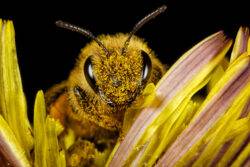Honeybees cannot process the sugar called mannose (Picture: Getty/500px Prime)
There is a type of sugar which is lethal to honeybees. That same sugar could one day help treat cancer in people.
Mannose, a sugar that is crucial to many functions in the human body, cannot be broken down by the insects, leading to ‘honeybee syndrome’.
It had also been shown in laboratory tests to inhibit the growth of several types of cancer cells, but scientists didn’t know why. By studying honeybee syndrome, they have discovered how it functions – and what hope it may offer for future treatments.
Mannose is involved in the process of glycosylation, in which the body adds sugar to proteins to stabilise their structure and help them interact with other molecules. Malfunctions in glycosylation can cause life-threatening diseases.
‘Until now, the most promising therapeutic use for mannose was to treat congenital disorders of glycosylation, diseases that can cause a wide range of severe symptoms throughout the body,’ said co-author Dr Hudson Freeze, from Sanford Burnham Prebys.
‘But we believe that there may be ways to leverage mannose against cancer and other diseases as well.
By replicating ‘honeybee syndrome’ scientists may have discovered a new way to treat cancer (Picture: Getty/500px)
‘It’s been known for more than a century that mannose is lethal to honeybees because they can’t process it like humans do. We wanted to see if there is any relationship between honeybee syndrome and the anti-cancer properties of mannose, which could lead to an entirely new approach to combat cancer.’
To investigate, the team used genetically engineered human fibrosarcoma cancer cells – a rare cancer that affects connective tissue – to recreate honeybee syndrome. They discovered that without the enzyme needed to process mannose, cells replicate slowly and are significantly more vulnerable to chemotherapy.
‘We found that triggering honeybee syndrome in these cancer cells made them unable to synthesise the building blocks of DNA and replicate normally,’ said Freeze. ‘This helps explain the anti-cancer effects of mannose that we’ve observed in the lab.’
Fibrosarcoma cancer cells (Picture: Getty)
However, the effects are unlikely to be universal across all cancers.
‘If we can find cancers that have a low activity of the enzyme that processes mannose, treating them with mannose could give just enough of a nudge to make chemotherapy more effective,’ said Freeze.
‘Many people assume that you always discover treatments in response to the disease, but sometimes you find biology that could be useful for treatment and then have to find the disease to match it.
‘[But it] could give cancer an extra punch alongside other treatments – and because mannose is found throughout the body naturally, it could improve cancer treatment without any undesirable side effects.’
The study is published in the journal eLife.
MORE : Diet Coke ingredient declared a ‘possible’ cause of cancer – with one big caveat
MORE : Vintage package holidays blamed for frightening new record
‘Honeybee syndrome’ is real.





